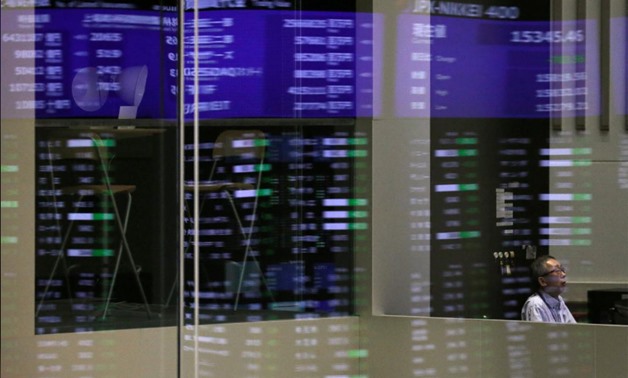
Market prices are reflected in a glass window at the Tokyo Stock Exchange (TSE) in Tokyo, Japan, February 6, 2018. REUTERS/Toru Hanai
TOKYO - 19 February 2018: Asian shares gained on Monday, joining a global recovery for equity markets as sentiment improved gradually from a recent shakeout that stemmed from fears of creeping inflation and higher borrowing costs.
MSCI’s broadest index of Asia-Pacific shares outside Japan rose 0.5 percent, having recovered more than 40 percent of their losses from late last month to last week’s low.
Japan’s Nikkei gained 1.3 percent.
Trading is expected to be slower than usual due to market holidays in the United States as well as Greater China.
On Wall Street, the S&P 500 rose marginally on Friday to mark its biggest weekly increase in five years, although earlier gains evaporated after a 37-page indictment filed by U.S. Special Counsel Robert Mueller charged 13 Russians and three Russian companies for meddling in the 2016 U.S. presidential election.
MSCI’s index of stock markets across the globe gained 4.3 percent last week, the best weekly performance since December 2011.
The rebound came after a two-week rout that wiped off more than 10 percent of value at one point, triggered by worries a rise in U.S. inflation may boost dollar funding costs.
The sell-off came as the corporate earning outlook improved on the back of strong global growth, bringing down equity valuations off their highs hit earlier this year.
Just before the market ructions in late January world shares were traded at 16.66 times the expected earnings, the highest levels since 2004, according to Thomson Reuters Datastream. They are currently at 15.33.
“The stocks’ valuation has become cheaper to levels that are on par with the assumption that long-term U.S. bond yields will shoot up to 3.15-3.20 percent,” said Nobuhiko Kuramochi, chief strategist at Mizuho Securities.
The U.S. 10-year Treasuries yield rose to four-year high of 2.944 percent last week, compared to 2.411 percent at the end of last year.
The two-year U.S. yield hit its highest level since 2008 last week as investors bet the Federal Reserve will raise interest rates at its next policy meeting in March.
The minutes of the Fed’s last policy meeting, held amid the equities tumble on Jan. 30-31, are due on Wednesday. Besides the outlook on rates, markets will be keen to see what if anything the Fed makes of the gyrations in markets.
A fall in the Vix index, a gauge of expected volatilities in U.S. stocks, also helped underpin improving sentiment.
The recent sell-off is believed to have been amplified by a jump in the Vix as many players are thought to have adjusted their portfolio in line with the change in volatilities.
“The latest rout was driven more by forced selling of such players as risk parity strategies and Commodity Trading Advisors (CTAs). Their selling appears to be over,” said Mizuho’s Kuramochi.
In the currency market, the dollar stabilized off its three-year lows against a basket of currencies.
The euro stood at $1.2426, backing down from Friday’s three-year high of $1.2556.
The dollar traded at 106.24 yen, bouncing back from its 15-month low of 105.545 set on Feb 16.
The U.S. currency has been weighed down by a barrage of factors, including worries about widening U.S. trade and budget deficits and speculation Washington might pursue a weak dollar strategy.
There is also talk that foreign central banks may be reallocating their reserves out of the dollar.
The weaker dollar propped up commodities.
U.S. West Texas Intermediate crude rose 1.2 percent in Monday Asian trade to $62.43 per barrel, extending their rebound from 1 1/2-month low of $58.07 set on Feb. 9.

Comments
Leave a Comment